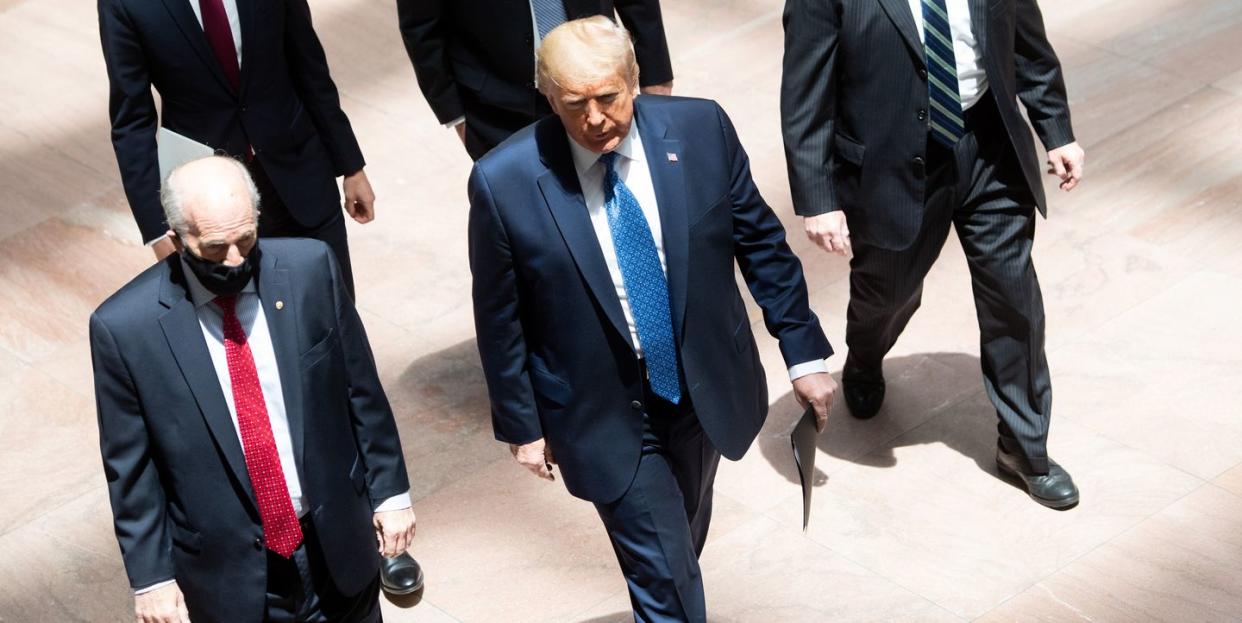Trump Is Threatening to Go Ukraine on Michigan Because They'll Let People Vote By Mail During a Pandemic

Just to recap a presidential abuse of power from 14 years—whoops, three months—ago, the president withheld vital aid to a United States ally, Ukraine, until the government of that country agreed to ratfuck the 2020 presidential election for his personal benefit. When he was impeached on the basis he'd misused the powers of his office in an attempt to extort a foreign country until it acted to undermine our democracy to help him get reelected, Pamela Karlan, a legal scholar from Stanford, testified in favor of his removal from office on those grounds. She also offered a future hypothetical.
"Imagine living in a part of Louisiana or Texas that's prone to devastating hurricanes and flooding. What would you think if you lived there and your governor asked for a meeting with the president to discuss getting disaster aid that Congress has provided. What would you think if that president said, 'I would like you to do us a favor. I'll meet with you, and I'll send the disaster relief, once you brand my opponent a criminal.' Wouldn't you know in your gut that such a president had abused his office, that he had betrayed the national interest, and that he was trying to corrupt the electoral process?"
Pamela Karlan: “What would you think if, when your governor asked the federal government for the disaster assistance that Congress has provided, the President responded, ‘I would like you to do us a favor.’ I’ll... send the disaster relief once you brand my opponent a criminal.” pic.twitter.com/J96FY30k3y
— House Judiciary Dems (@HouseJudiciary) December 4, 2019
That isn't quite how things shook out in our very unfortunate reality. Donald J. Trump has not, so far, attempted to precisely recreate his Ukrainian extortion scheme with state governors. (His lackeys may still be mucking around in Ukraine to this very day, however.) What he has done is repeatedly threaten to deny aid Congress has appropriated for states to respond to the coronavirus pandemic and the economic shutdown it necessitated until leaders of those states grant him concessions. That is, he's talking about withholding disaster aid from states—and the American citizens who live there—until their leaders agree to do his bidding. It's almost a threat of sanctions against his own constituents, as if Lansing is Tehran.
In April, the president threatened to deny COVID-19 support to states and cities that choose not to cooperate with his draconian immigration policies. (Remember this the next time conservatives start screaming about states' rights and the 10th Amendment. Also, when Republicans, including Trump, claim Democrats are trying to cram their unrelated priorities into pandemic relief bills.) And on Wednesday, the president went more directly after the 2020 elections.
Breaking: Michigan sends absentee ballots to 7.7 million people ahead of Primaries and the General Election. This was done illegally and without authorization by a rogue Secretary of State. I will ask to hold up funding to Michigan if they want to go down this Voter Fraud path!..
— Donald J. Trump (@realDonaldTrump) May 20, 2020
He even tagged, in a follow-up, the director of his Office of Management and Budget, his chief-of-staff, and...the Department of the Treasury? This raises the prospect he tweeted at Mark Meadows, that White House chief-of-staff, while he was standing next to him. It also makes it obvious this is a threat rather than a course of action he is actually pursuing currently. But it is a dangerous authoritarian spasm nonetheless, and he's trotted it out in response to the news Michigan's secretary of state will mail the state's voters absentee ballot applications, not even the ballots themselves. He also threatened Nevada.
State of Nevada “thinks” that they can send out illegal vote by mail ballots, creating a great Voter Fraud scenario for the State and the U.S. They can’t! If they do, “I think” I can hold up funds to the State. Sorry, but you must not cheat in elections. @RussVought45 @USTreasury
— Donald J. Trump (@realDonaldTrump) May 20, 2020
The president calls information he doesn't like "Fake News"—yesterday, a scientific study with an unfavorable outcome became an "enemy statement"—and calls election results he doesn't like "voter fraud." It's not more complicated than that. It began in 2016, when he lost the popular vote by 3 million votes and started yelling that all three million votes were counterfeit. 3 million! That's quite an operation, and they didn't leave a shred of evidence that Trump's phony Voter Fraud Commission could find. That thing was folded up years ago now, after everyone on it—including the clownish Kris Kobach—got embarrassed. The president is in many ways just a particularly garish expression of Republicanism, which generally holds that their party's voters are the only legitimate source of political power in our society—the Real America.
Voter fraud in general is rare. In-person voter fraud, which Republicans have cited for a decade as justification for voter-suppression policies like Voter ID, is so rare as to border on functional non-existence. Basically no one impersonates someone else to vote illegally, but these policies do make it harder for Other People to vote. The party's zeal for remedying this non-existent problem is actually an indication they are more interested in shrinking the electorate than appealing to new groups beyond their traditional base of older white Christian voters. Republicans, including Trump, have already said explicitly that they oppose vote-by-mail because they think they will struggle to win elections with higher turnout. Vote-by-mail fraud is also rare. States like Oregon, which has used it since 1998, have not had problems. The primary example of absentee ballot fraud is recent, however: a campaign operative in North Carolina was charged with election fraud for his work in 2018. He allegedly fooled around with ballots on behalf of the Republican congressional candidate.
And now the president is threatening to abuse the powers of his office, and endanger the lives and livelihoods of American citizens, if their political leaders move to guarantee them safe access to the ballot during a global pandemic—and, in Michigan's case, while the state faces extreme and perilous flooding. Republicans thought their ideal outcome was Wisconsin, where conservatives in the legislature and the state supreme court forced voters to risk their lives by voting in person at the height of the pandemic. Wisconsinites reacted by surging to the polls to turf out the conservative justice Republicans were trying to keep in place, but the intent was clear. We're now learning the party is developing a strategy of full-on voter intimidation at the polls this year, which they were previously caught doing in 2004, 1990, 1986, and 1982.

The uncomfortable truth is that the modern Republican Party is an authoritarian political institution for which securing and protecting power for itself and its voters, regardless of what the majority of citizens want, is the overriding philosophy. That's why you'll hear them scream about letting people vote by mail, but you won't get a peep about the fact that Georgia Republicans just cancelled an election(!), allowing the Republican governor to simply appoint a state supreme court justice to serve for the next two years. (Judges shouldn't be elected, but if they are, you can't just cancel the election.) When Democratic candidates won governors' offices in Michigan, Wisconsin, North Carolina, Kansas, and more over the last few years, Republican legislatures moved to strip those offices of their powers before the Democrats could exercise the authority vested in them by the citizens of those states. They might have been elected, but they were not legitimate. They weren't Republicans.
In this way, the current Republican leadership at the national level is perfectly representative. Mitch McConnell, the Senate majority leader, is a brazen megalomaniac who has shredded the institutions of democracy, strangling the legislative process and turning the upper chamber of Congress into a conservative judge confirmation machine. He has also announced his virulent opposition to voting by mail nationally during a pandemic that will likely rear its head again in earnest this fall. The interests of the American people broadly always come second, if at all, to the political interests of the party.
The president, meanwhile, only speaks the language of force, possibly from his prior career spelunking the business underworld and rubbing shoulders with the kind of people who operate down there. He is orchestrating The Great American Heist, but more than that, he has declared himself immune to congressional oversight, ransacking the principle that we have three co-equal branches of government with the growing support of his McConnell-supplied allies in the Judicial Branch. Now he's routinely firing inspectors general—a position created in the aftermath of Watergate as an additional mechanism of Executive Branch accountability—when they've found or they're set to uncover malfeasance on his part or that of his cronies.
Trump himself understands leverage and power, not the kind of persuasion and appeals to reason that should constitute public discourse in a democratic republic. Even rhetoric itself is not a tool he uses to convince anyone of things. It's a bludgeon he wields to batter the various Enemies until they give up. He will hammer "voter fraud" until he can exact some gain from it, or until this country decides to save itself from ruin. The problem is this latest lie could make it harder for the country to do that. It's why he's pushing it so hard.
You Might Also Like

